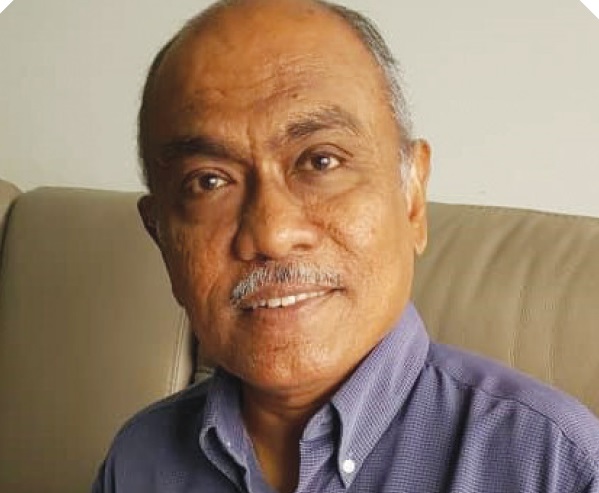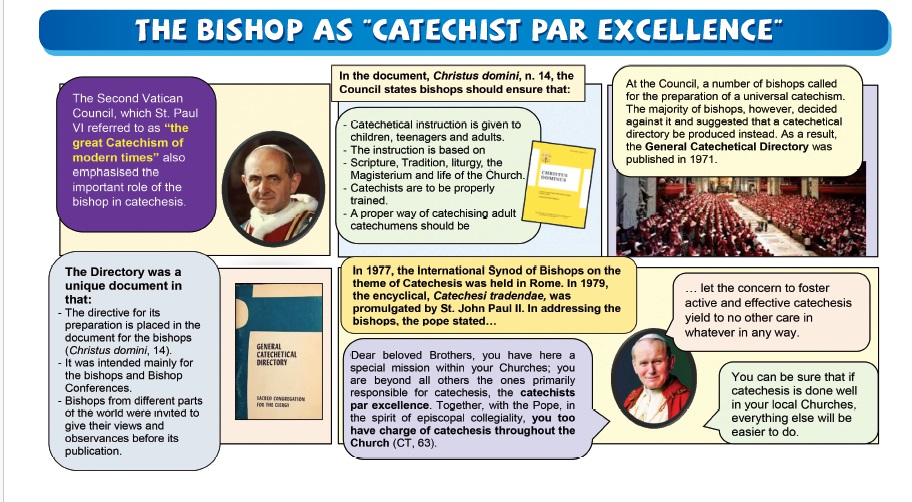The Bishop as “catechist par excellence”
The Bishop as “catechist par excellence”
Sep 20, 2024

In the previous article, I examined the role of the bishops in the ministry of catechesis from the First Vatican Council to the early 20th century. In this article, I will discuss their contribution from the Second Vatican Council to the publication of the General Catechetical Directory in 1971.
Second Vatican Council (1962 – 1965)
The Second Vatican Council was the twenty first ecumenical council in the history of the Church. St. Paul VI often referred to the Council as “the great Catechism of modern times”. At the Council, the responsibility of the bishops for catechesis was again emphasised. In the document, Christus Domini, n. 14, the tasks of the bishop are stated as follows:
1. Bishops should ensure that catechetical instruction be given with diligent care to children, adolescents and adults.
2. Bishops should see to it that this instruction is based on Sacred Scripture, tradition, the liturgy, magisterium, and life of the Church.
3. Bishops should take care that catechists be properly trained for their task.
4. Bishops should also strive to renew or at least adapt in a better way the instruction of adult catechumens.
At the Council, a number of bishops also spoke about the “unfinished work” of the First Vatican Council and called for the preparation of a universal catechism. The majority of bishops, however, decided against a single catechism and suggested that a catechetical directory be produced instead. The directory would serve as a guidebook for the implementation of catechesis in the local churches. As a result, the ‘General Catechetical Directory’ was published in 1971.
General Catechetical Directory (1971)
In itself, the General Catechetical Directory (GDC) is a unique document since it was the first of its kind to be produced for use in the entire Church. It was published in accordance with the Second Vatican Council document on the Decree on the Bishop’s Pastoral Office, known in Latin as Christus Dominus (n. 44). Here, the Council, besides calling for the revision of the Canon Law and the preparation of a directory for the pastoral care of special groups of the faithful, also requested the compilation of:
“…a directory for the catechetical instruction of the Christian people in which the fundamental principles of this instruction and its organisation will be dealt with and the preparation of books relating to it.
Interestingly, there are a number of observations that can to be made in the preparation of the GDC.
Firstly, that the directive for the preparation the catechetical directory is placed in the document for the bishops highlights again the essential relationship between the bishop and the ministry of catechesis.
Secondly, the directory itself was primarily intended for the bishops, as well as, for Bishop Conferences, and generally, for all those who, under the leadership of the bishops, have responsibilities in the catechetical field.
Thirdly, while the initial draft of the GDC was prepared by a team of catechetical experts, the views and observations of bishops from different parts of the world were sought, especially at the second stage of the preparation of the document.
Catechesi Tradendae (1979)
In 1977, the International Synod of Bishops was held in Rome with catechesis as its focus. It was the first major gathering of bishops from the entire world to discuss the theme of catechesis. Soon after the synod, St John Paul II promulgated one of the most important documents on catechesis, Catechesi Tradendae (CT). In addressing the bishops, the pope states:
“Dear beloved Brothers, you have here a special mission within your Churches; you are beyond all others the ones primarily responsible for catechesis, the catechists par excellence. Together, with the Pope, in the spirit of episcopal collegiality, you too have charge of catechesis throughout the Church” (CT, 63).
The bishop is primarily responsible for catechesis
According to the pope, the bishop is the person most responsible for catechesis. He is “the catechist par excellence”. The pope goes on to say that although the ministry of the bishop grows more complex and overwhelming daily, whereby, “A thousand duties call you: from the training of new priests to being actively present within the lay communities, from the living, worthy celebration of the sacraments and acts of worship to concern for human advancement and the defence of human rights…”
“… but let the concern to foster active and effective catechesis yield to no other care whatever in any way” (CT, 63).
The concern of the bishop for catechesis should lead him to personally transmit the doctrine of life to the faithful. He should take on the chief management of catechesis in the diocese. In addition, he has to bring about and maintain a “real passion” for catechesis and put in place the necessary personnel, means, equipment, and financial resources. To emphasise this point, the pope states:
“You can be sure that if catechesis is done well in your local Churches, everything else will be easier to do” (CT, 63).
The bishop shares the responsibility with the pope Bishops, says the pope, share responsibility for catechesis for the whole Church with the Roman Pontiff. Together with the pope, they participate in the task of teaching and safeguarding the faith. He reminds the bishops:
“…. although your zeal must sometimes impose upon you the thankless task of denouncing deviations and correcting errors, it will much more often win for you the joy and consolation of seeing your Churches flourishing because catechesis is given in them as the Lord wishes” (CT, 63).
Conclusion It has to be observed that from the Second Vatican Council onwards, the role of the bishop in catechesis has an added dimension. That is, his responsibility is not only confined to his diocese. It extends to the whole Church in a spirit of collegiality with other bishops under the leadership of the Holy Father. In the next article, I will conclude the discussion on the role of the bishop in catechesis in relation to the principle of collegiality.
---------------------------------------------------
The key ideas of the article are presented in a simple illustrated format as below. The images are taken from public domain. 
Dr Steven Selvaraju, STD, STL, holds a Doctorate in Theology with Specialisation in Catechetics and Youth Ministry from Pontifical Salesian University, Rome. He serves as Director of the Archdiocesan Catechetical Centre, Archdiocese of Kuala Lumpur.







Total Comments:1